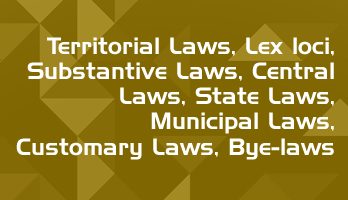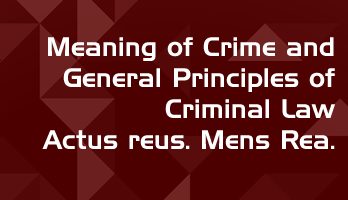Free Full Course Available on LawMint's YouTube Channel
How to Land Your Dream LLB Internship in a Top Law Firm
- Part 1 - Introduction
- Part 2 - Internship Planning
- Part 3 - Internship Research
- Part 4 - Building Your Profile
- Part 5 - The Email
- Part 6 - The Resume
- Part 7 - The Cover Letter
- Part 8 - The Interview
- Part 9 - Self Development
Practical and comprehensive course, with real examples and step-by-step analysis of the complete internship application process. Check out LawMint's YouTube channel now!
Legal Systems of the world can be divided into four broad categories
- Common Law System
- Continental Legal System
- Socialist Legal System
- Legal System among International Institutions and countries inter se.
Socialist Legal System
An important legal system which has influenced the development of many other legal systems of the world is called ‘Socialist Legal System’.
This Legal System was adopted by those countries which had started following socialist and Marxist philosophy especially after the First World War of 1914-19. You might be aware that the socialist philosophy was practically adopted by the former U.S.S.R. and China.
When the U.S.S.R. disintegrated in the late 1980s, all breakaway countries adopted this Legal System with some modifications, such as Ukraine, Kazakhstan, and Uzbekistan. Apart from China, other countries, such as Mongolia, North Korea and Cuba follow this legal system.
We cannot say that this legal system is quite different from Common Law and Continental Legal System. Instead, we must know that the ‘Socialist Legal System’ has been influenced by Continental and Common Law systems. However, there are certain features of this legal system which have distinguished it from other legal systems.
Those features are :
- Legal rules are not considered permanent
- Importance of public law
- No judicial review of administration and law passed by the legislature; and
- Great influence of Continental Legal System.
(a) Legal Rules are not considered permanent
According to the adherents of this legal system, law is considered to be of temporary character and a time would come when law will not be necessary to govern. The moment everybody would become economically equal, there would be no requirement of law. To promote economic equality, courts and law are required. Law, in ‘Socialist Legal System’, is of revolutionary nature.
Unlike Continental Legal System where law is of static character, the ‘Socialist Legal System’ throws away any law which promotes private property and wealth. For example, when the former U.S.S.R. adopted Socialist Legal System, all the laws promoting private and commercial rights were abolished. Those laws were called ‘bourgeoisie law’.
Socialist laws are revolutionary in the sense that they do not recognize old laws which sustained capitalism based on private rights and free markets. It aims to overthrow those power relations which build a capitalist system.
(b) Importance of Public Law
In ‘Socialist Legal System’, Private Law has no space and all law has to be in the nature of ‘Public Law’ which means that all law deals with State matters or public matters, such as Constitutional Law, Administrative Law, and Criminal Law.
By Constitutional Law, we mean that law which determines the nature of the State and the structure of the government. It is above and superior to the ordinary law of the land.
Administrative Law deals with the structure, powers and functions of the organs of administration, the limits of their powers etc.
Private Law, which regulates and governs the relations of citizens with each other, is either abrogated or is given less importance than the Public Law. Examples of Private Law are the law of torts, contract, property, and intellectual property rights. In ‘Socialist Legal Systems’, many branches of Private Law have shifted and have become a part of Public Law.
Thus, Law of Contract which was considered to be a law regulating the contractual freedom of individuals has also now been substantially controlled and the freedom to contract has been severely restricted in this Legal System.
(c) No judicial review of administrative action and law passed by the legislature
Socialist Law theorists traditionally argue that the legislature is conceived to be the supreme expression of the will of the people and beyond the reach of judicial restraint. Legislation, not judicial decisions, is recognized as the sole source of law.
They do not believe in the theory of ‘separation of powers’ according to which the legislature, executive, and the judiciary are independent and separate from each other. Instead, it believes in the unity of all State organs and above all superiority of legislature.
It is assumed that the legislative body is responsible for maintaining the constitutionality of State actions and that constitutional review could not be exercised by extra-parliamentary bodies, such as the judiciary. The Constitutions of socialist countries are recognized as the supreme legal force.
The judiciary cannot have the power to review the law passed by the legislature and rules framed by the executive under the authority of legislature. The power of ‘judicial review’ is considered as a tool of the bourgeoisie.
(d) Influence of Continental Legal System
The ‘Socialist Legal System’ is greatly influenced by the ‘Continental Legal System’. The members of the socialist family of legal systems are those countries which formerly belonged to the ‘Continental Legal System’ and the characteristics of that Legal System is still preserved in it except the importance of Private Law.
The judges do not enjoy the power to authoritatively interpret the law and to modify it. Judicial precedents cannot be made by the judges who enjoy only the power to apply the given laws and promote social and economic justice thereby. Further, the court proceedings are not adversarial in character but it follows the inquisitorial approach and public prosecution is regarded as provider of justice rather than punishing the offenders.
The legal field is also not strictly divided among criminal, civil, and intellectual property. This legal system is an integrated one where lawyers may move from one area to another (e.g., from criminal to civil law or from being a defense attorney to a prosecutor) without additional entrance requirements.
Questions
What do you understand about ‘Socialist Legal System’? Discuss its salient features.
‘Socialist Legal System’ means a Legal System in which some of the basic features are present, namely
(a) law is considered to be of revolutionary character and not static
(b) Public law is given more prominence than any other branches of law
(c) Acts of administration and the laws passed by the legislature are normally not reviewed. The examples of such a legal system are : Russia, China, Mongolia, North Korea.
Do you think that India should adopt Socialist Legal System? Assess the advantages and disadvantages of this legal system for India.
India has been following Common Law System for the last two hundred years and adopting another legal system would be costly and chaotic. There is no need to adopt another system, but instead to reform the existing system.
In adopted, the advantages of Socialist Legal System in India would be :
(a) judiciary will not waste its time in reviewing the law passed by the Parliament/State Legislatures
(b) majority of time consumed by the lower courts in settling private disputes would be saved.
The disadvantages of Socialist Legal System would be
(a) private property, which is considered a status symbol for every individual, would not be legally protected
(b) arbitrary acts of executive would increase.
Write five lines each about Public and Private Law.
Public Law means that branch of law which deals with state matters or public matters, such as Constitutional Law, Administrative law, and Criminal law.
The nature of public law is different from private law. Private law regulates and governs the relations of citizens with each other.
Examples of Private Law are : Law of Torts, Contract, Property. Socialist Legal System deals with Public Law and not Private Law.
Mention if the following statements are correct or incorrect
In Socialist Legal System, Private Law has no space and all law has to be in the nature of ‘Public Law’.
The above statement is correct.
In Socialist Legal System, ‘Legislation’ not ‘Judicial decisions’, is considered as the sole source of Law.
The above statement is correct.
The Socialist Legal System is greatly influenced by the Continental System.
The above statement is correct.
Article Summary : Socialist Legal System is that system in which Private Law is given little importance whereas Public Law is regarded as Supreme. Judiciary normally does not review administrative actions and laws passed by the legislature.
Free Full Course Available on LawMint's YouTube Channel
How to Land Your Dream LLB Internship in a Top Law Firm
- Part 1 - Introduction
- Part 2 - Internship Planning
- Part 3 - Internship Research
- Part 4 - Building Your Profile
- Part 5 - The Email
- Part 6 - The Resume
- Part 7 - The Cover Letter
- Part 8 - The Interview
- Part 9 - Self Development
Practical and comprehensive course, with real examples and step-by-step analysis of the complete internship application process. Check out LawMint's YouTube channel now!
Acknowledgement : This article is adapted from Swayam – NIOS course material.












